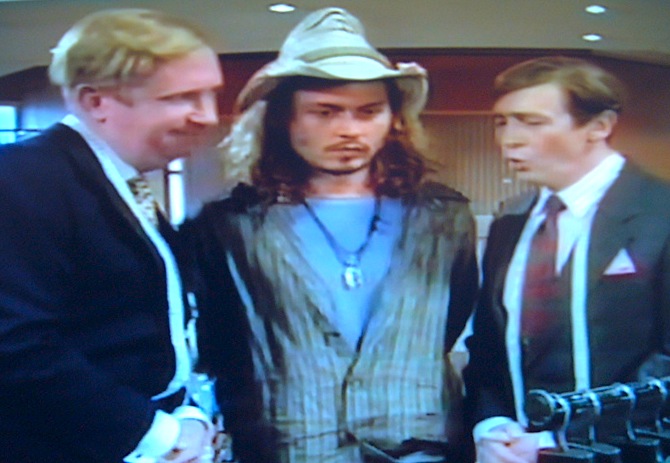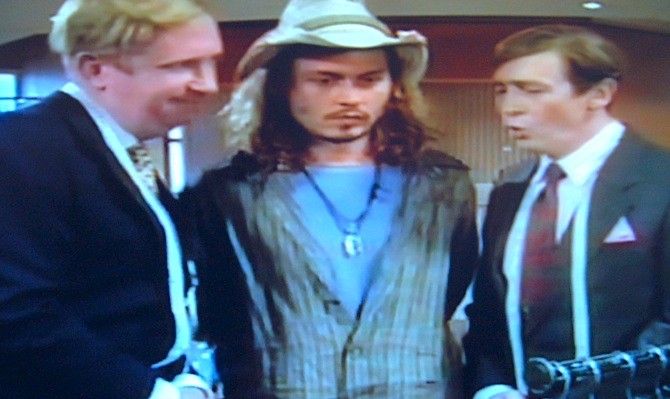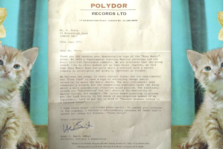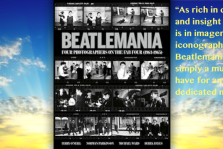In 2000, The Sunday Times asked Tony Barrell to go on location with The Fast Show. He analysed the appeal of this great comedy institution, interviewed its stars, and witnessed the surprise appearance of the show’s most famous fan – Johnny Depp
THE SUNDAY TIMES, 2000
On Whit Sunday this year, I saw The Fast Show self-destruct. They were in Middlesbrough, a place they normally like for its density of varied locations, and they were supposed to be filming two special 40-minute shows for video release and subsequent BBC2 broadcast. But I saw members of the hit comedy team fighting each other, and I was there when their production office exploded. Which isn’t nice at all. One minute it was there and the next it was a fireball, and the police aren’t looking for any other suspects.
Nobody was inside the modest, two-storey building at the time, but all those comedy characters they created in the 1990s might as well have been. Ken and Kenneth, the predatory tailors unhealthily obsessed with other people’s sex lives (”Were you out with a lady last night, sir?” “Oohhh! Suit you, sir”). Ralph, the English aristocrat with the undeclarable gay passion for his humble Irish gardener, Ted. Rowley Birkin QC, the ancient toff burbling through indistinct anecdotes from his life (”It was swollen to twice its usual size… I’m afraid I was very, very drunk”). Insecure Woman, continually asking: “Does my bum look big in this?” They and all the others, too humorous to mention, were symbolically going up in smoke.
The driver accelerated to 35mph and went straight through the front wall of the production office, leaving a huge hole
It had to die. “One of the reasons we’re finishing The Fast Show,” explained Charlie Higson, co-producer of the series with Paul Whitehouse, “is that we don’t want to just be churning it out because people want it and the BBC want more. There’s a danger of doing it and not enjoying it any more – it becomes, ‘Oh God, we’ve got to write another Suit You sketch.’” But there was surely no need for a programme that had charmed about 4m viewers an episode, and won a string of TV awards, to end so violently.
The first clue I had that things were going awry was the sudden, fierce roar of a green Rover 214sLi. Whoever was driving the car accelerated to about 35mph and went straight through the front wall of the production office, leaving a huge hole and almost coming out the other side of the building. Medics and firemen were on the spot in seconds. Technicians and extras gathered, faces lined with worry, questions on their lips that they daren’t ask. “Was anybody in there?” “Where’s Paul?” “Who was driving?” “Has somebody died?”
There was a long pause while the firemen went in and the querulous muttering continued. Then they came out, somebody cordoned off the building and there were screams and shouts for everyone to get back before the whole place went up in a deafening clap, windows blowing out, flames and debris shooting into the sky. Scorchio!
I suppose I realised what was really happening when I saw John Thomson putting on a set of pre-charred clothes and entering the shell of the building. At the slap of a clapperboard, the 31-year-old actor was filmed bursting out through the door, giving a familiar thumbs-up signal.
They’ve been shooting a Deaf Stuntman routine, simple as that. Once again, Thomson’s Deaf Stuntman character has grossly misheard his instructions and gone way beyond the call of duty, placing himself in maximum danger. Finally, as the shooting script put it, “He emerges phoenix-like from the carnage.” Through the magic of editing, this would become a typically pacy sketch, one-and-a-half minutes short. It was, of course, a real stuntman who drove the car into the building, which wasn’t really their production office but a condemned dockside cabin, its wall refaced with fragile plasterboard for the occasion, on a comedy set pretending to be a drama set. And the conflagration was a technically controlled gas explosion.
The show had its bottom smacked when it broadcast sketches about a family who were all in-denial alcoholics
But there were still serious questions to be answered. The Fast Show had already had its bottom smacked for its choice of material, when it broadcast sketches about a family who were all in-denial alcoholics. “Whitehouse and Higson are wrong to think that addiction is a suitable subject for light entertainment,” The Daily Telegraph had pronounced. Surely disability is even less worthy of comic treatment? “The thinking behind it is that he’s stood too close to too many explosions,” explained Higson later, in one of the show’s fleet of trailers. “A lot of Fast Show jokes are about people who really shouldn’t be doing the jobs they’re doing, and not realising.” His face, already a very serious one for a professional humorist, momentarily frowned. “No, I suppose you shouldn’t do jokes about deaf people. But it opens a debate.”
“They can laugh about their condition, can’t they?” Whitehouse chipped in, his humorous eyebrows arching over twinkly brown eyes. “Except they wouldn’t be able to hear themselves laughing.” As he is apt to do, he lapsed into one of his famous voices, as if a switch had just been thrown in his head. This time it was the impertinent football pundit Ron Manager: “Do we really live in a very politically correct world? I don’t think so at all. Tits everywhere these days, aren’t there?”
In the nearby make-up trailer, Mark Williams was also going into character, having curly black hair glued into his ears and his nostrils to match the fuzzy wig on his head. “I didn’t think we’d get everybody together again for this, actually,” he said. “It was lucky that we all – or the bulk of us – were available.” (Caroline Aherne was the only member of the team who couldn’t make it, tied up on her Royle Family series.) Within minutes he would be huddled in a naff brown car coat, standing inside a huge tyre not far from the River Tees, as a camera descended from above on a boom. Let’s hope this 41-year-old, Oxford-educated actor – who has appeared in RSC productions and the films Shakespeare in Love and 101 Dalmatians – would remember his lines.
“You ain’t seen me – roit?” he declaimed, in a threatening Worcestershire accent, reprising a self-written role he has enjoyed since the first series. A couple of takes, and that’s it.
“It’s a doddle for me, to be quite honest, this show,” said Williams. You Ain’t Seen Me doesn’t get to say a lot, does he? “No, I’m one of the people who still believe it’s called The Fast Show.” Some of the other members of the team, he said, have started spinning the sketches out too much for his liking. Ted and Ralph, for example, have not only clocked up several minutes an episode but appeared in their own spin-off special show. Is it because he is a bona fide actor, whereas most of the others started as comedians? “Yes, they take comedy a lot more seriously than I do – although they’ll jump on that and say actors are luvvies. It’s very competitive, and I don’t like that arena.”
Charlie Higson and Paul Whitehouse, longtime mates and old comedy muckers, came to blows. It had been a long day
These dark hints of conflict were nothing, however, to what would occur later that day. Higson and Whitehouse, longtime mates and old comedy muckers, actually came to blows. It was nearly 7pm, it had been a long day, and the sun was peeping out of dark grey clouds over the local saltworks. The two 42-year-old comedians emerged from the same car looking tough, tired and determined. They walked up to a pair of fibreglass Roman columns, bright yellow against the otherworldly hills of sodium chloride. They were both wearing skimpy gladiatorial outfits and fake tans, and carrying shields, swords and a mace. They were doing a period remake of their Long Big Punch-Up sketch.
The original sketch, in the final series, had Higson and Whitehouse punching each other over and over again by a river, grunting and groaning, the whole thing captured by a faraway camera. “It was all one take,” recalled Higson, “and in the end we cut it up into a few bits and pieces. If you look at it, you can see that towards the end we’re just pissing ourselves laughing. It looks a bit like agony from a distance.”
For the remake, the initial plan had been to use furniture instead of fists. “But various people said, ‘It’s exactly the same sketch.’ We said, ‘It’s The Fast Show, that’s what we do, just keep repeating the same sketch.’ And they said, ‘But this is exactly the same.’ And then I was on the way to work one day and I thought, ‘Well, we’ll make them gladiators, then. People like that Gladiator film.’”
So now, as the camera rolled, the two cod Romans started lunging at each other relentlessly, rhythmically, choreographically, with their weapons, as the director, Mark Mylod, collapsed with laughter over the monitor screen. The whole production crew were in fits. “I don’t know why it’s funny,” said Mylod, “it just bloody is.”
When a comic scene has been reproduced a number of times, it reaches the stage of being a classical type or model. It becomes amusing in itself
Henri Bergson, who wrote the essay Laughter exactly a century ago, understood the comic value of repetition, and of orchestrating “an obvious clockwork arrangement of human events” – whether it be an implausibly endless battle, or a series of sketches that begin or end with exactly the same words: “This week I’ll be mostly…”, “I’ll get me coat,” “Simple as that,” “Which was nice.” At points, Bergson could be writing specifically about The Fast Show: “When a comic scene has been reproduced a number of times, it reaches the stage of being a classical type or model. It becomes amusing in itself, quite apart from the causes which render it amusing. Henceforth, new scenes, which are not comic de jure, may become amusing de facto, on account of their partial resemblance to this model.”
But this bunch fight shy of any scholarly analysis of their comedy. Basically, if they find something funny, it goes in the show; if they don’t, it doesn’t. The BBC2 cutting-room floor is littered with Fast Show rejects – characters like Road Rage Man, Mid-Life Crisis Man, and Scratch and Sniff (a Thomson grotesque who continually scratches his bottom and then sniffs his fingers). “The one thing we have done well, I think,” said Williams, “is that our internal editing system has been good. We’ve all worked in situations in telly where people have gone, ‘It’s good, it’s funny,’ and you go, ‘No it’s not, and you know it’s not. Why are you trying to convince each other that it is?’”
Thomson was hoping that his two new character creations will be accepted for the final shows, although his commitments with the ITV drama Cold Feet meant he couldn’t stay for the whole week’s shoot in Middlesbrough. “I’m gutted that I’m only here for a day,” he said. Both of his ideas have a sci-fi bent. One is “a stranded astronaut who just turns up, in torn clothing – you just throw him into different scenarios – and his catchphrase is, ‘Where am I? What year is this? Who’s the president?’ The other character, we’re not agreed on this yet, is the Time-Travelling Confectioner. Someone says, ‘I don’t half fancy a packet of Old English Spangles,’ and he goes, ‘Wait there.’ He goes through a portal and comes back with some. ‘I don’t half fancy some Tiger Tots.’ ‘Just wait there!’ And every time, he comes back in a different 1970s outfit.”
It is clear that Whitehouse and Higson – “the bosses”, as Thomson calls them – have the casting vote on what goes in and what doesn’t. But they don’t always agree between themselves. “We argue quite a lot, actually,” says Whitehouse. “I wanted to put in a sketch where people are playing pontoon, and a card is turned over and it’s the eight of spades – at which point the band Motörhead crash through the wall and go, ‘The eight of spades, the eight of spades.’ And I think it’s very funny, but he doesn’t.”
“No…” sighed Higson. It’s one of his shorter catchphrases.
*************************************************
There is a character in the series who, for Paul Whitehouse at least, prophesies how The Fast Show will be received by generations to come. He is Arthur Atkinson, the chirpy music-hall-era comedian who tickles his easily-pleased audiences with lines like “Where’s me washboard?” and “Now! I’ve seen you in the butcher’s buying liver instead o’ lamb. That’s no way to run a boardin’ ‘ouse, is it? Eh? ’Ow queer, ’ow queer.”
“Arthur,” explains Whitehouse, “is a kind of acknowledgment of the fact that The Fast Show is a collection of impenetrable phrases which will probably have absolutely no relevance to people in a few years’ time.” Distinguished critics, let alone Fast-fixated fans, would find that an over-pessimistic assessment. The writer John Mortimer, for instance, has compared Whitehouse and his works to Dickens. In 1997, Royal Television Society judges said the comic had “a brilliant eye for comic detail” and “for capturing inner truths” and gave him a Television Performance of the Year award, which was joined the following year by two Fast Show Baftas. The experienced Hollywood actor Johnny Depp -– more about him later -– has dubbed the Fast Show troupe “geniuses” of the narrative and dramatic arts. And the show is now used as a cultural yardstick: a recent Harold Pinter stage production was excoriated on BBC2 with a complaint that the playwright “hasn’t seen The Fast Show… Comedy is so quick these days”.
One of Whitehouse’s mates at the council had a comic routine that was the inspiration for the Suit You tailors
Oddly enough, it all started at a snail’s pace. Paul Whitehouse and Charlie Higson, the Lennon and McCartney of British sketch comedy – the heart and brain, respectively, of the show – met in 1977 at the University of East Anglia. They formed “Norwich’s first punk band”, the Right Hand Lovers, with Higson as the singer and Whitehouse on guitar. While the more disciplined Higson stayed the course and finished his degree, his friend was asked to leave during the second year, having been, he says, “a bit too enthusiastic in enjoying myself”. Whitehouse moved to Hackney in east London, where he worked for four years as an environmental health clerk at the council. One of his municipal mates, he says, had a comic routine that was later the inspiration for the Suit You tailors.
In the mid-1980s, Higson also moved to Hackney, where he lived in a squat with one Harry Enfield. Official records show a marked rise in beer-swilling and silly voices in local pubs around this time. When Enfield started doing stand-up comedy, Whitehouse and, later, Higson started contributing a few lines. Before long they were professional jokers, signed up to the Enterprise Allowance Scheme, and Enfield was performing as the kebab-shop raconteur Stavros and, later, as a Thatcherite plasterer who nailed the zeitgeist waving wads of cash. They were making Loadsamoney, if you like.
In the early 1990s Whitehouse came out of his shell, appearing on Enfield’s BBC shows, for which he and Higson wrote more material. His transformation from pub joker to public property was complete. But not everything they did met with Enfield’s approval – he famously turned down the Suit You tailors, arguing that viewers would think they were gay. “And I don’t know why that was a problem,” says Whitehouse.
Legend has it that The Fast Show was conceived at a press launch for one of Enfield’s series, when a tape of edited highlights was shown, giving Higson and Whitehouse the idea of speeding up the television sketch format, creating fun-size comedy for the soundbite age. “Because of Harry’s show, we didn’t want to make it The Paul Whitehouse Show,” says Higson, “we wanted to have a proper team, like Monty Python. So we just got people that we liked.” The actress Minnie Driver almost joined them, reveals Higson, “but she decided to go to Hollywood instead”.
The No Offence character was inspired by a real woman that Arabella Weir knew with a harsh Afrikaans accent
“Charlie came to a recording of an Alexei Sayle show that I was doing,” says Arabella Weir. “He was sort of mumbling away in his Charlie-ish way, and he went, ‘We’re going to do a sketch show type of thing, but we don’t really know how to write women things. And you’re quite funny – why don’t you see if you can come up with something?’” Her first fully realised character was Insecure Woman, and hot on her heels was No Offence, the in-store cosmetics adviser whose South African accent only emphasises her tact-and-diplomacy deficit. Such is the plausibility of this character that, when they were filming a sketch this summer in the Binns department store in Darlington, says Weir, she was mistaken for a genuine make-up expert: “They hadn’t cordoned off any of the shop and I was wearing the same colours as the Yves Saint Laurent woman. And No Offence loses it at one point – a woman says, ‘No, thank you,’ and walks past, and I go, ‘No! This isn’t going to happen! You come back here right now!’ I could see all these shoppers laughing, going, ‘Look at that woman.’”
Like several other Fast Show characters, No Offence was inspired by a real person – in this case, a woman that Weir knew with a particularly harsh Afrikaans accent. Whitehouse got the idea for Rowley Birkin from a man he met on a fishing trip in Iceland: “We were all fishing, and he’d talk and be fairly indistinct occasionally. I remember doing a little impersonation, and thinking it was very much in keeping with The Fast Show to have a bloke talk for two minutes and all you hear is the occasional snatch.” Only some of the distinct snatches are scripted, and Whitehouse is free to extemporise between them. “We write some phrases up on a board and then I go, ‘Aiscrgdhagagahha… third on the grid at Monaco… wowwrghsrysi… ahhhhh…. crude oil, covered from head to toe.’”
Competitive Dad, the excruciating father who refuses to let his children beat him at anything, is also observational. “It’s based on a guy I saw at a swimming pool with his two kids,” says Simon Day. “The kids were both in water wings, and I think they said, ‘You want a race, Dad?’ He went, ‘Yeah.’ He hung on the side of the pool, and then just took off and swam as fast as he could, then waited at the other side.”
Some of the acts have more celebrated antecedents. Louis Balfour, the laid-back John Thomson character who presents Jazz Club – “Great… nice…” – has a voice that is part Roger Moore – specifically Lord Brett Sinclair, his character in The Persuaders – and Bob Harris, the “whispering” DJ who presented The Old Grey Whistle Test in the 1970s. “And the look came purely by accident,” says Thomson. “There was a wig hanging about, a small ginger basin cut. The original wig didn’t even fit me: my head’s massive, it’s 24in all the way round.”
Sometimes the characters seem to emerge fully formed from the BBC dressing-up box. “One thing I do love,” says Thomson, “is just getting a bag of hats and a bag of wigs. And we’ll go, ‘Put that on,’ ‘Put that on,’ and it just happens. When we’re together, all the minds start working.” This spontaneous approach has created gems like the Posh Cockneys, a bunch of frightfully well-spoken tweedy types who persistently claim to be working-class Londoners. “Hellay, we’re cockneys…”
In the let’s-pretend world of The Fast Show, it’s hard to believe that the show’s retirement is the real thing. And bets are being quite openly hedged here. “We’re calling these two specials The Last Fast Show Ever, Part 1 and 2,” says Whitehouse. “I’m sure that a few years down the line, when everything else we do has turned to dust, we’ll come grovelling back.”
“The idea is, this is the end,” says Arabella Weir. “We all thought it was, and then, when we were doing the show in Middlesbrough, we went, ‘Will we be back?’ ‘Yeah, bollocks, ’course we will.’”
“We will inevitably do stuff with some of the characters, in one form or another,” says Higson. He has considered furthering the career of Colin Hunt, his worryingly irrepressible office joker (”I’m mad, I am… The bells, the bells”): “I’ve thought about doing a Colin Hunt sitcom, where he’s diagnosed with cancer. It would be about someone joking to the end.”
The more one investigates, the more it seems The Fast Show is busy having a big family of comedy children. Simon Day tells me he is writing a sitcom for Billy Bleach, the irritating pub know-it-all (”Someone’s sitting there, mate”). Ron Manager already has his own video, Fast Football, and Arabella Weir’s Insecure Woman has spawned a bestselling novel, Does My Bum Look Big in This? “I’d like to write a sitcom with No Offence in it,” says Weir. I’ve imagined her home life – she’s got a horrible, horrible marriage. Just imagine – ‘Thank you, Wally, thank you for the criticism. I really appreciate it.’”
His lines are in the script, but whether Johnny Depp is going to turn up is a question that only the Hollywood megastar himself can answer
Whitehouse and Higson have been discussing the real possibility of a Fast Show film, but as yet it is unclear whether it will be like Monty Python’s Meaning of Life, or more like Mutiny on the Buses. One idea, says Whitehouse, is “The Fast Show as a kind of microcosm of Britain floating around in space. It’s such a load of old bollocks, it made us laugh. We’d call it Fast in Space”.
But there is dissent again from Mark Williams: “I’ve worked in films, and it’s a very difficult thing to do. I’d hate us to be involved in some terrible, parochial British comedy film. I couldn’t bear that.”
Perhaps all this talk of the big screen has been inspired by the possible involvement of one of the show’s most devout and least likely fans. As the shooting of the two Fast Show farewell specials nears its conclusion, there are anxious whispers on location, and in the corners of BBC studios. His lines are written in the script, but whether Johnny Depp is really going to turn up is a question that only the Hollywood megastar himself can answer. Maybe it’s all a silly joke.
*************************************************
It’s a more or less ordinary Sunday at BBC Television Centre in London, and Studio 1 looks like a funny little microcosm of urban life. There’s an office — a fake office, where Colin Hunt works. Next to that is a pub, the ultimate proletarian arena for Fast Show action, where characters like Billy Bleach and Anyone Fancy a Pint? occasionally hang out. Next to that is a tailor’s shop, lined with racks of suits, with television cameras rolling about in front of it. Usually there’s a friendly, laid-back feel to a Fast Show recording, but today the air seems charged. One name keeps being mentioned, wherever you go: Depp, Depp, Depp. “Will he? Won’t he?” says Charlie Higson, vocalising his worries. Paul Whitehouse, dressed as Ken the cheeky tailor, yawns. On page three of the day’s script is a guide to the occupants of the various dressing rooms: Higson has No 1, Whitehouse is in No 2, and No 3 is reserved for a chap called Juan Profundo.
Hang about — that’s Spanish for “John Deep”, isn’t it? Security is so tight, their guest star has had to be code-named; so tight, in fact, that the woman from the BBC public-relations department is patrolling the main entrance to ensure that jobsworths don’t fail to recognise him and turn him away. It’s gone 5.30pm and everything is running horribly late. He should be here, now, recording a sketch as an American customer in Whitehouse and Williams’s shop.
Over an hour later, a scruffy actor passes through security and shambles onto the set. He has just come off a plane from a film shoot in Prague. He is unshaven, with long hair under a floppy-brimmed hat, a stripy shirt hanging out of old-looking jeans, tattoos peeking out from rolled-up sleeves, and scuffed shoes. “You’re an American, aren’t you, sir?” says Whitehouse, straight from the script.
After rehearsing and recording the sketch, Depp lights a cigarette in the tailor’s shop and asks Whitehouse if he has shot any of the Rowley Birkin sketches yet. He pronounces “Rowley” as if it rhymes with “jowly”. The British comedian, a tape measure still round his neck, gives him his own private performance: “Ahhggfhhh…. aygshosjk…”
If I’m going to some incredibly remote part of the universe, I have to have Fast Show tapes, everywhere I go
“The Suit You sketch kills me,” says Depp afterwards, sipping pastis and water in his dressing room. “But they all do, they all do in their own way.” He first saw the show on a British hotel TV, several years ago. “I caught it just flicking through the channels, and I just fell in love.” When the BBC heard of his passion, they sent him a full set of videos. “It’s a must if I’m travelling,” he says. “If I’m going to some incredibly remote part of the universe, I have to have Fast Show tapes, everywhere I go. Really, I think these guys are – I really do – I think they’re the most brilliant actors out there today. The ability to, sort of, just be in the moment and roll with whatever’s thrown at you and react – that’s what it’s all about. And these guys are just brilliant reactors.”
The 37-year-old star of Edward Scissorhands and Sleepy Hollow had never acted in a sketch show before. “I sort of like the way it happened: I just got off the plane, you know, sweating like some kind of hideous swine, and grabbed all my luggage and got in a car and hauled ass over here and went straight to the stage, not really knowing the lines so well.” Was he essentially playing himself? “I was so confused, I imagine I must’ve been, to some extent. The deal with these guys is,” he laughs, “basically there’s no way to be funny around ’em, so you just sort of shut up and nod your head.”
There are footsteps in the corridor outside; we don’t know it yet, but it’s Whitehouse, ready to perform for a live audience who have just trooped into the building. He is dressed as Jed Thomas, the Tourette’s-afflicted yokel.
Is Depp saddened that The Fast Show has come to an end? “Oh, for now,” says the actor, sceptically. “I think they should make a film.”
Whitehouse enters the room. “Arse!” he says. His timing is as immaculate as ever. It could be the final word on The Fast Show ’s big-screen future. ♦
© 2014 Tony Barrell










0 comments found
Comments for: TOO FAST TO DIE